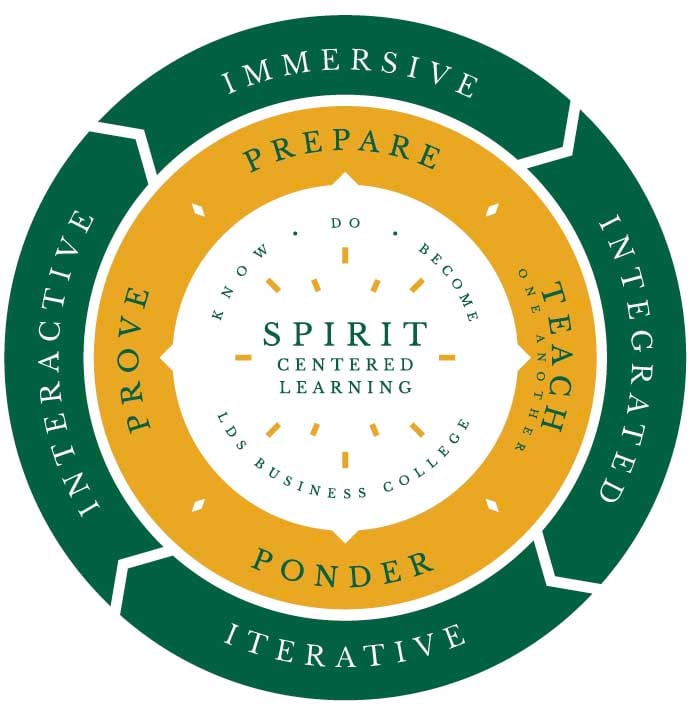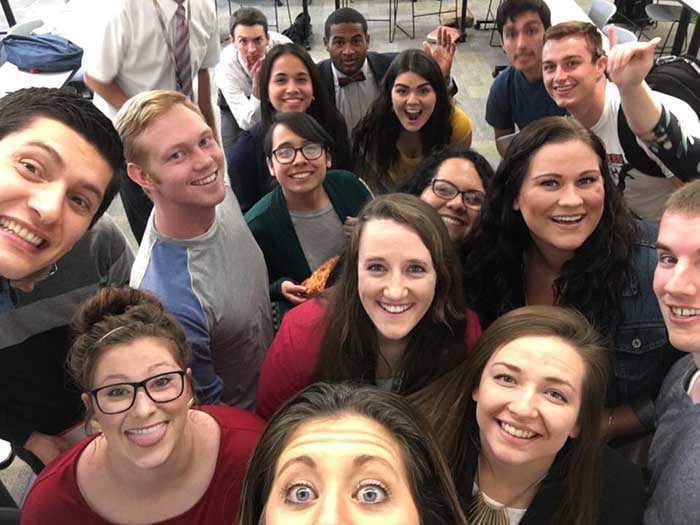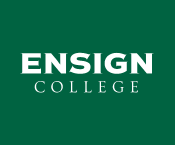“We need to educate the rising generation more deeply and more powerfully than we have ever done before .... Deep learning is ‘an increase in the power to Know, to Do, and to Become.’”
— Elder Kim B. ClarkDeep Learning at LDSBC
Mar 2019

Deep Learning in Practice:
An Interview with Leslie Robbins, LDSBC Instructor of Business 160
What was the introduction of deep learning like?
It’s been a journey. President Kusch approached me and asked if I wanted to try something, so we began researching learner agility and deep learning. We did research with a control group with the traditional curriculum—a course in a box—and then with the other group, we walked in and said, “This is your class. What would it take for you to immerse yourself completely in the subject of leadership?” Within the first five minutes, the students were at the whiteboard designing the course. We gave them the outcomes and the deep learning principles that we’d like to see in the class. They created engaging experiences and assignments; they owned it. It was very hard for some students because we were disrupting their notions of education. But they came to see themselves and others as well as the actual subject in a different light, which lines up with transformational learning theory. And because of the reliance on the Spirit, they had an increased awareness of their divine potential.
What can you tell us about the deep learning principles?

The principles are the same; they won’t change. A deep learning environment is more Spirit centered. There’s a reliance on and a recognition of the Spirit because the students are put in pressure-cooker experiences that cause them to really immerse themselves and go all in. Subject-matter immersion (SMI) is the method we use to help students reach deeper levels of learning. The thing with SMI is that the students really are the ones who are immersed in the learning; they’re in the center of it, and they’re designing it. The five deep learning principles are the results we see: We see students taking more responsibility for their learning. We see an increase in their confidence, in their competence, and in their capability. And we can measure it through a soft-skills assessment we’ve designed.
Was it hard as a teacher to implement deep learning for the first time?
Yes. I’ve been teaching for 21 years, so it was a leap of faith. I had to spiritually prepare for class in ways that I never had to before. It has changed my whole perception of myself as a teacher and as a daughter of God. I’ve used the Atonement of Jesus Christ more with this type of teaching than in all of my 21 years in higher ed. The rewards and the miracles have been sacred, and they just keep coming.
What made the transformation of some students deeper than others?

There are always some standouts. We had a young girl who was placed in a leadership position; she anchored the leadership event. She was 18 years old and didn’t see that capability in herself. She stood in front of the class and said, “I can’t do this.” Sure enough, she did it. Now she’s going on a mission because she gained the confidence in this class to see herself as a leader. There is this willingness and this desire that the students have to learn. Some learn it on the very first day. Others see their weaknesses and then build from there.
What has President Kusch’s role been in this process?
President Kusch was really the one who gave vision to this and aligned it to Elder Clark’s principles of deep learning and vision for Church education. As we were looking at ways to help students reach deep learning—which Elder Clark defines as to know, to do, and to become—we thought about the types of learning environments that would help us. One environment was subject-matter immersion. President Kusch’s premise was that you’re not going to arrive at a job and have your boss give you a 14-week syllabus and say, “Okay, here’s the plan.” He wanted to build learner agility and to help the students experience something that they would experience in the real world. Deep learning looks different in each program, but the principles are the same.
Related Articles

Student Insights
Read what a few students thought about some experiences they had from the classes they attended, and how it changed them.

Encouraged to Teach, Inspired to Give
“Ensign College is a jewel in the Church Educational System.” – Scott Newman

Why Ensign College?
Elder Paul Johnson talks about how Ensign College will complement other CES schools and fill some gaps in curriculum.
